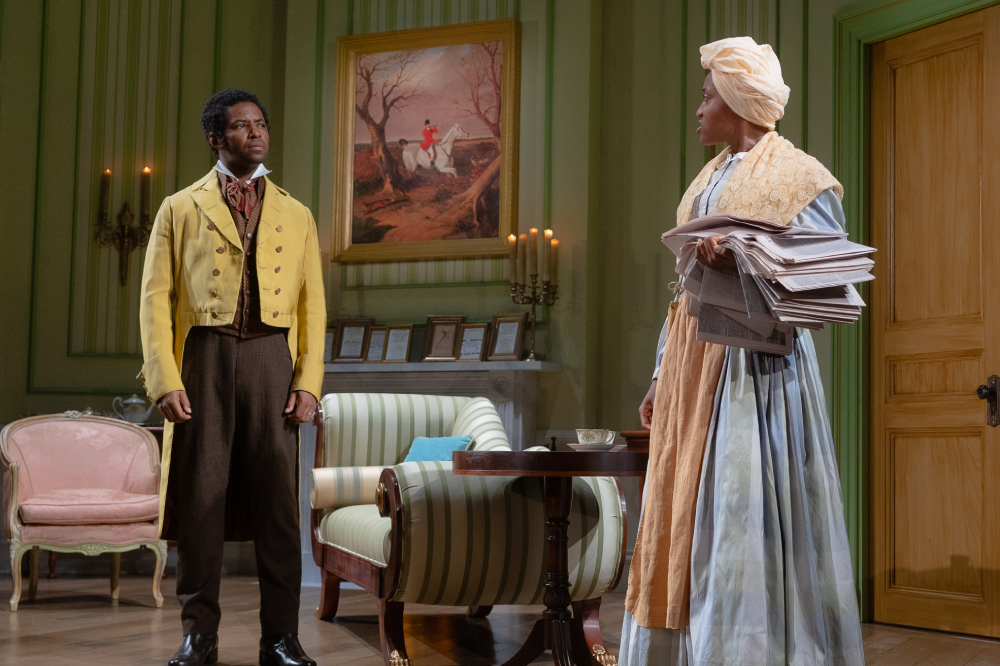Culture
 Photo of Amari Cheatom and Shannon Dorsey in Red Velvet courtesy of Shakespeare Theatre Company.
Photo of Amari Cheatom and Shannon Dorsey in Red Velvet courtesy of Shakespeare Theatre Company.
“Red Velvet” Writer Lolita Chakrabarti on a 19th Century Story for the 21st Century
June 17, 2022 @ 3:00pm
“Red Velvet,” written by Lolita Chakrabarti and directed by Jade King Carroll, made its area debut this week at the Shakespeare Theatre. The play seeks to inspire audiences by introducing them to the story of real-life actor Ira Aldridge.
Chakrabarti’s husband (British actor Adrian Lester) asked if she knew of Aldridge, this fascinating Black British actor alive the 1800s. She hadn’t heard of him. It immediately set her on a creative path to learn more about him and why he wasn’t more widely known.
“His life was fascinating — touring Britain extensively from 1824 to 1852, his marriage and his mistress, his subsequent children and their fascinating lives, his epic tours in Europe where he played in English opposite companies speaking their own language, his awards and honors, his frustrations, his state funeral in Poland, his influence across the continent and across the arts of that time. He crossed paths with novelist Charles Dickens, composer Richard Wagner, writers Hans Christian Anderson and Leo Tolstoy and Ukrainian poet, writer, artist, public and political figure, Taras Shevchenko, to name a few,” Chakrabarti says. “He was instrumental in the formation of the National Theatre of Serbia, and I am convinced he indirectly influenced seminal Soviet and Russian theatre practitioner, Konstantin Stanislavsky.”
With these worthy and vast accomplishments in mind, for “Red Velvet,” Chakrabarti chose to focus on what she regards as Aldridge’s big break in 1833 when Edmund Kean, the greatest actor of his generation, collapsed on stage at the Theatre Royal Covent Garden and Aldridge was ask to step in. That play was Shakespeare’s “Othello,” and it would be the first time a Black actor ever played the role.
“Red Velvet” places this historic event in theatre in front of the backdrop of another historic political event: a bill sent to Parliament that promoted the abolition of slavery. Chakrabarti doesn’t believe that this story is strictly a period piece.
“I wrote this play through a twenty-first century eye on a nineteenth-century story,” she says. “But I am also a great believer in history repeating itself until it finally changes.”
She sees many parallels between Aldridge’s challenges and those faced in culture today. Whether reflecting on racism in the press and prejudice in society or the pressures on a Black actor to prove his worth while giving honest performances that many criticized, Aldridge’s story reverberates in modern-day audiences.
Chakrabarti hopes her play speaks to the importance of representation in theatre, especially with classic and well-known (and sometimes well-trodden) plays such as Shakespeare’s works.
“Shakespeare used many things to motivate his characters; sometimes it’s their race, sometimes it’s their sex and sometimes it’s their position in society. But mostly his drama is about depth and complexity of character — in this context diversity is essential,” she says. “Keeping his plays relevant to today’s audience demands new voices, new lenses, new explorations of who we are now. Representation is a key element to really excavating classic roles and what they mean to us today.”
Ultimately, Chakrabarti hopes that “Red Velvet” can do for audiences what she sought to learn about and discover so many years ago. “I hope they will now know who Ira Aldridge was — not only a fearless pioneer, but a flawed man and a great artist.”
“Red Velvet” runs through July 17. You can purchase tickets here.
Shakespeare Theatre: 610 F St NW, DC; shakespearetheatre.org // @shakespeareindc







